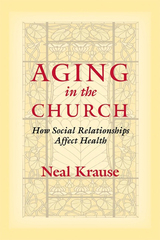
A growing number of studies indicate that older people in the church form social ties that have a significant positive impact on their physical and mental health. In Aging in the Church, Neal Krause comprehensively assesses the various relationships that stem from church involvement.
Among the many types of relationships Krause explores are close companion friendships, social-support structures (such as assistance provided by fellow church members during difficult times), and interactions that arise from Bible study and prayer groups. Through his thorough investigation of the underlying links between these relationships and the ways they relate to attributes like forgiveness, hope, gratitude, and altruism, the author hopes to explain why older adults who are involved in religious activities tend to enjoy better physical and mental health than those who are not engaged in religious communities. Going beyond merely reviewing the existing research on this subject, Aging in the Church provides a blueprint for taking research on church-based social relationships and health to the next level by identifying conceptual and methodological issues that investigators will confront as they delve more deeply into these connections.
Though these are complex issues, readers will find plain language and literature drawn from a wide array of disciplines, including sociology, psychology, public health, medicine, psychiatry, nursing, social work, gerontology, and theology. Literature, poetry, philosophy, and ethical ideas supplement the insights from these diverse fields. As a result, Aging in the Church takes on a genuinely interdisciplinary focus that will appeal to various scholars, researchers, and students.
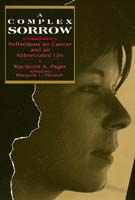
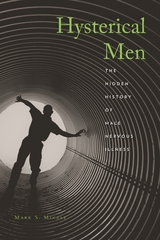
Over the course of several centuries, Western masculinity has successfully established itself as the voice of reason, knowledge, and sanity—the basis for patriarchal rule—in the face of massive testimony to the contrary. Hysterical Men boldly challenges this triumphant vision of the stable and secure male by examining the central role played by modern science and medicine in constructing and sustaining it.
Mark Micale reveals the hidden side of this vision, that is, the innumerable cases of disturbed and deranged men who passed under the eyes of male medical and scientific elites from the seventeenth century onward. Since ancient times, physicians and philosophers had closely observed and extravagantly theorized female weakness, emotionality, and madness. What these male experts failed to see—or saw but did not acknowledge—was masculine nervous and mental illness among all classes and in diverse guises. While cultural and literary intellectuals pioneered new languages of male emotional distress, European science was invested in cultivating and protecting the image of male, middle-class detachment, objectivity, and rationality despite rampant counter-evidence in the clinic, in the laboratory, and on battlefields.
The reasons for suppressing male neurosis from the official discourses of science and medicine as well as from popular view range from the personal and psychological to the professional and the political. They make for a history full of profound silences, omissions, and amnesias. Now, however, under the greatly altered circumstances of today’s gender revolution, Micale’s work allows this story to be heard.
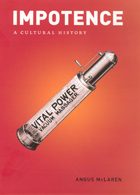
As anyone who has watched television in recent years can attest, we live in the age of Viagra. From Bob Dole to Mike Ditka to late-night comedians, our culture has been engaged in one long, frank, and very public talk about impotence—and our newfound pharmaceutical solutions. But as Angus McLaren shows us in Impotence, the first cultural history of the subject, the failure of men to rise to the occasion has been a recurrent topic since the dawn of human culture.
Drawing on a dazzling range of sources from across centuries, McLaren demonstrates how male sexuality was constructed around the idea of potency, from times past when it was essential for the purpose of siring children, to today, when successful sex is viewed as a component of a healthy emotional life. Along the way, Impotence enlightens and fascinates with tales of sexual failure and its remedies—for example, had Ditka lived in ancient Mesopotamia, he might have recited spells while eating roots and plants rather than pills—and explanations, which over the years have included witchcraft, shell-shock, masturbation, feminism, and the Oedipal complex. McLaren also explores the surprising political and social effects of impotence, from the revolutionary unrest fueled by Louis XVI’s failure to consummate his marriage to the boost given the fledgling American republic by George Washington’s failure to found a dynasty. Each age, McLaren shows, turns impotence to its own purposes, using it to help define what is normal and healthy for men, their relationships, and society.
From marraige manuals to metrosexuals, from Renaissance Italy to Hollywood movies, Impotence is a serious but highly entertaining examination of a problem that humanity has simultaneously regarded as life’s greatest tragedy and its greatest joke.

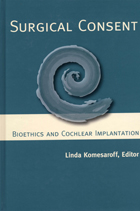
With the rate of cochlear implantation reaching 80% to 90% of all deaf children, some as young as five months old, Surgical Consent: Bioethics and Cochlear Implantation arrives at a critical juncture. This comprehensive collection features essays by Priscilla Alderson, Inger Lise Skog Hansen, Hilde Haualand, volume editor Linda Komesaroff, Paddy Ladd, Harlan Lane, Karen Lloyd, Eithne Mills, Paal Richard Peterson, Gunilla Preisler, Kristina Svartholm, and Michael Uniacke. These worldwide renowned ethicists, educators, and Deaf leaders express their diverse perspectives on the bioethics of childhood cochlear implantation according to their discipline and a number of themes of inquiry: human rights, medical and social ethics, psychology, education, globalization, identity, life pathways, democracy, media, law, and biotechnology.
Drawing on current research, this volume presents the varying reactions around the globe to the high rate of implantation. These views contrast sharply with the medical perspective of deafness overwhelmingly promoted through the media and by the cochlear implantation industry. At the same time, the contributors aim to disrupt the binaries that have long dominated the field of deafness — speech versus sign, instruction through speech and sign systems versus bilingual education, and medical intervention versus cultural membership in the Deaf community.
Surgical Consent begins and ends with the voices of Deaf people. Their articulate and, at times, raw insights clearly delineate the issues of power, positioning, and minority-majority group relations that are inherent in the dominant hearing culture’s understanding of diversity and globalization.
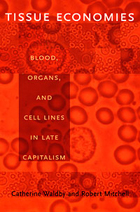
Waldby and Mitchell pull together a prodigious amount of research—involving policy reports and scientific papers, operating manuals, legal decisions, interviews, journalism, and Congressional testimony—to offer a series of case studies based on particular forms of tissue exchange. They examine the effect of threats of contamination—from HIV and other pathogens—on blood banks’ understandings of the gift/commodity relationship; the growth of autologous economies, in which individuals bank their tissues for their own use; the creation of the United Kingdom’s Stem Cell bank, which facilitates the donation of embryos for stem cell development; and the legal and financial repercussions of designating some tissues “hospital waste.” They also consider the impact of different models of biotechnology patents on tissue economies and the relationship between experimental therapies to regenerate damaged or degenerated tissues and calls for a legal, for-profit market in organs. Ultimately, Waldby and Mitchell conclude that scientific technologies, the globalization of tissue exchange, and recent anthropological, sociological, and legal thinking have blurred any strict line separating donations from the incursion of market values into tissue economies.
READERS
Browse our collection.
PUBLISHERS
See BiblioVault's publisher services.
STUDENT SERVICES
Files for college accessibility offices.
UChicago Accessibility Resources
home | accessibility | search | about | contact us
BiblioVault ® 2001 - 2024
The University of Chicago Press









